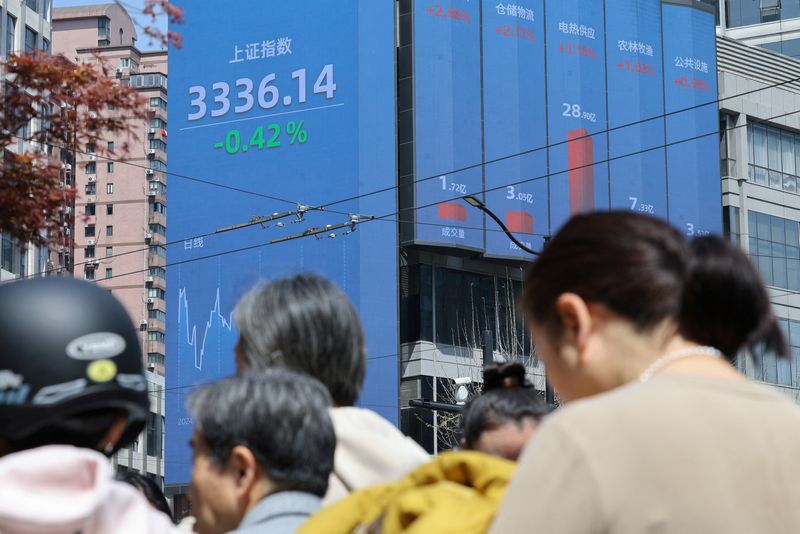Analysis-China’s $19 trillion stock market, once called uninvestable, lures foreigners again
By Summer Zhen, Samuel Shen and Jiaxing Li
HONG KONG (Reuters) -Foreign investors are plotting a return to China’s stock markets in a big way three years after pulling back and terming them uninvestable, encouraged by the tech opportunities on offer, and a growing demand for diversification beyond U.S. assets.
Progress in China’s adoption of artificial intelligence and its development of semiconductors and innovative drugs this year has given comfort to global investors that the Sino-U.S. trade war and Washington’s tech export bans have not deterred innovation in the world’s second-biggest economy.
The U.S.-China tariff truce and a domestic monetary easing environment have further boosted sentiment. As a consequence, the Shanghai Composite index touched a decade high last week while Hong Kong stocks hit a four-year high.
The changing sentiment of foreign investors could potentially add fuel to the market rally, which has so far been mainly driven by domestic players.
Foreign early birds are already back in China, lured by this year’s bull run and as they seek diversification from crowded U.S. assets, said Brett Barna, a former hedge fund manager who now manages two New York-based single-family offices.
“China is interesting because it’s very uncorrelated to the rest of the world, at least the onshore A-share market,” Barna said, adding he plans to set up an investment platform that would allow U.S. and European capital to access China’s capital markets.
Data on fund launches and flows illustrates the growing enthusiasm for a $19 trillion Chinese stock market, including Hong Kong.
August marked the biggest monthly buying of China stocks by global hedge funds in six months, according to a report by Morgan Stanley, which did not detail numbers.
Morningstar data showed the number of emerging market ex-China equity fund new launches slid to eight in 2025 versus 21 in 2024 and 16 in 2023. That meant demand for emerging market investments that did not include China had cooled substantially this year.
“A year ago, people wanted to exclude China from indices. Now, China is seen as a standalone asset class (they cannot ignore),” said Zheng Yucheng, chief investment officer of the China fund unit of Allianz Global Investors.
MORE EVIDENCE
The anecdotal evidence is also piling up.
Polar Capital, a London-based $20 billion asset manager, pivoted to a positive stance on China in late 2024 from underweight and has further increased the China allocation to over 30% from the low 20% range within its emerging market portfolio this year, said its fund manager Jerry Wu.



Leave a Comment
Your email address will not be published. Required fields are marked *